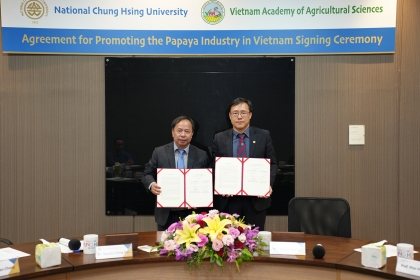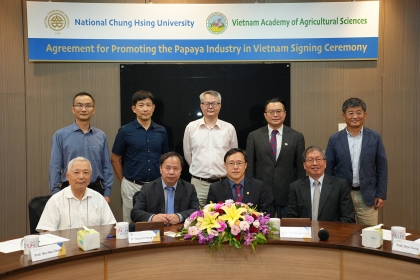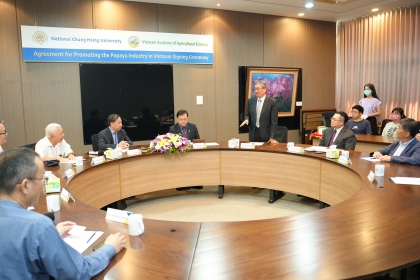Taiwan Agricultural Technology Export: NCHU Assists Vietnam in Establishing
2023-11-29
興新聞張貼者
Unit秘書室
1,438
National Chung Hsing University (NCHU) and the Vietnam Academy of Agricultural Sciences (VAAS) signed a cooperation agreement on November 1. The signing ceremony was attended by VAAS President Nguyen Hong Son, NCHU Vice President for International Affairs Chou Chi-Chung, and Professor Yeh Shyi-Dong from the Department of Plant Pathology. NCHU will assist in introducing tissue-cultured (TC) seedlings of Tainung No. 2 variety and provide advanced cultivation techniques to help Vietnam establish a modern and efficient papaya cultivation system, aiming to make Vietnam a leading producer of high-quality papayas in Asia.
The collaboration project will be led by renowned papaya expert, Academician Yeh Shyi-Dong of the Academia Sinica. In 2017, with support from the National Science and Technology Council (NSTC), NCHU and VAAS jointly established the “Agricultural Science and Technology Innovation Cooperation” (VAAS-NCHU ASTIC). Over the years, they have successfully assisted the local passionfruit industry and provided agricultural biotechnology and intellectual property (IP) exports in areas such as bio-fertilizers, bio-pesticides, soil disease control, and virus disease prevention, establishing innovative industries and markets in Vietnam.
Academician Yeh Shyi-Dong mentioned that Vietnam’s geography, especially in the Red River Delta where agriculture is concentrated in the north, is similar to the climate in the central and southern regions of Taiwan. The Mekong Delta in the south has a year-round summer without typhoons, fertile land, and abundant water sources, making it one of the few regions in the world suitable for papaya cultivation.
However, both northern and southern Vietnam face significant challenges due to Papaya Ringspot Virus (PRSV), severely impacting large-scale commercial papaya production. NCHU collaborated with the Plant Protection Research Institute (PPRI), Southern Horticultural Research Institute (SOFRI), and Nong Lam University in Ho Chi Minh City through VAAS-NCHU ASTIC. Six years ago, they introduced a small quantity of TC seedlings of Tainung No. 2 variety, which have been cultivated for over fifty years in Taiwan, for trial planting and observation. In 2022, a cooperation project was signed with VAAS to introduce 3,000 TC seedlings for vaccine protection trials at four locations. The results are promising.
The current cooperation agreement plans to establish papaya cultivation demonstration fields in different provinces and sign a 250-hectare commercial promotion cooperation agreement with the Vietnamese Ministry of Agriculture and Rural Development (MARD) next year. This aims to facilitate technology transfer in varieties, tissue culture, vaccine propagation, and inoculation, constructing a commercial-scale planting and marketing model for Vietnam’s papaya industry.
VAAS, overseeing 19 national-level agricultural research units and four sister agricultural universities of NCHU, serves as the central hub for agricultural research and development in Vietnam. NCHU will also assist VAAS in personnel training, providing comprehensive agricultural technology export—from soil selection, planting methods, automated irrigation systems, weed control cover, appropriate fertilization, to the use of pesticides for insect and pathogen control—bringing Taiwan’s successful agricultural technology experience to foreign countries.
The collaboration project will be led by renowned papaya expert, Academician Yeh Shyi-Dong of the Academia Sinica. In 2017, with support from the National Science and Technology Council (NSTC), NCHU and VAAS jointly established the “Agricultural Science and Technology Innovation Cooperation” (VAAS-NCHU ASTIC). Over the years, they have successfully assisted the local passionfruit industry and provided agricultural biotechnology and intellectual property (IP) exports in areas such as bio-fertilizers, bio-pesticides, soil disease control, and virus disease prevention, establishing innovative industries and markets in Vietnam.
Academician Yeh Shyi-Dong mentioned that Vietnam’s geography, especially in the Red River Delta where agriculture is concentrated in the north, is similar to the climate in the central and southern regions of Taiwan. The Mekong Delta in the south has a year-round summer without typhoons, fertile land, and abundant water sources, making it one of the few regions in the world suitable for papaya cultivation.
However, both northern and southern Vietnam face significant challenges due to Papaya Ringspot Virus (PRSV), severely impacting large-scale commercial papaya production. NCHU collaborated with the Plant Protection Research Institute (PPRI), Southern Horticultural Research Institute (SOFRI), and Nong Lam University in Ho Chi Minh City through VAAS-NCHU ASTIC. Six years ago, they introduced a small quantity of TC seedlings of Tainung No. 2 variety, which have been cultivated for over fifty years in Taiwan, for trial planting and observation. In 2022, a cooperation project was signed with VAAS to introduce 3,000 TC seedlings for vaccine protection trials at four locations. The results are promising.
The current cooperation agreement plans to establish papaya cultivation demonstration fields in different provinces and sign a 250-hectare commercial promotion cooperation agreement with the Vietnamese Ministry of Agriculture and Rural Development (MARD) next year. This aims to facilitate technology transfer in varieties, tissue culture, vaccine propagation, and inoculation, constructing a commercial-scale planting and marketing model for Vietnam’s papaya industry.
VAAS, overseeing 19 national-level agricultural research units and four sister agricultural universities of NCHU, serves as the central hub for agricultural research and development in Vietnam. NCHU will also assist VAAS in personnel training, providing comprehensive agricultural technology export—from soil selection, planting methods, automated irrigation systems, weed control cover, appropriate fertilization, to the use of pesticides for insect and pathogen control—bringing Taiwan’s successful agricultural technology experience to foreign countries.




